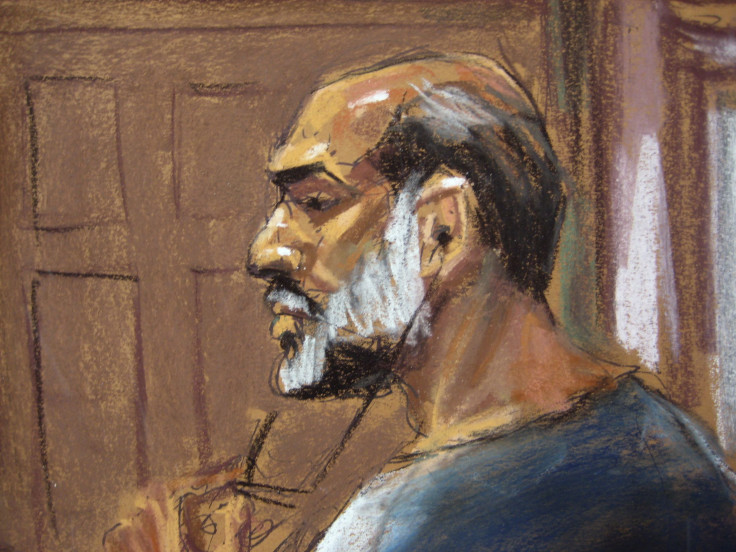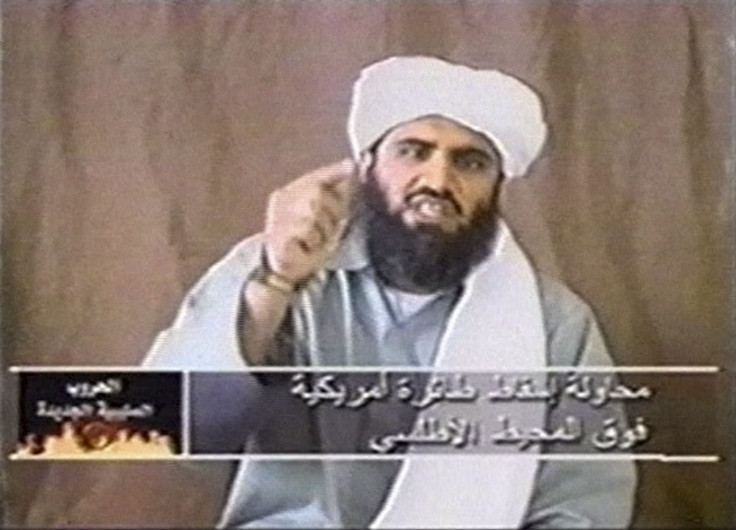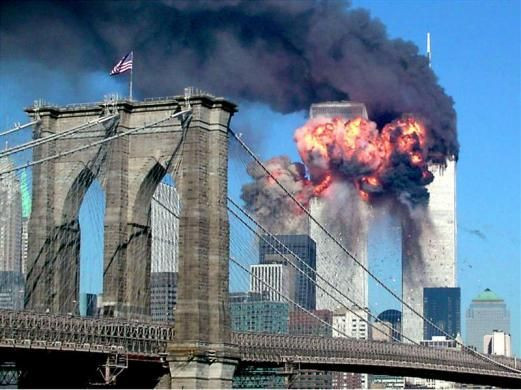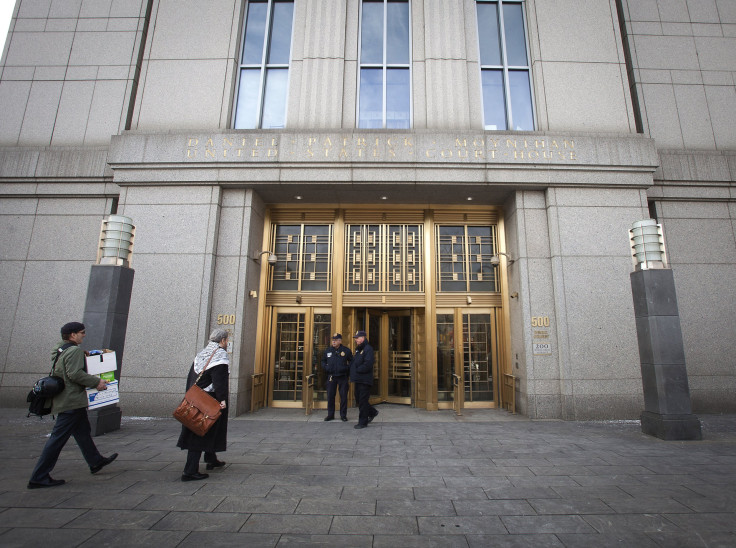A Day In Court: The Trial Of An Al Qaeda Terrorist Who New York Forgot About

NEW YORK -- Outside the U.S. District Courthouse, crowds of people stream past on an otherwise normal Wednesday lunch break in Manhattan. People chat about colleagues at work, what they’ll be doing the coming weekend, the crisis in Ukraine. A French tourist stops to photograph the impressive façade of the Daniel Patrick Moynihan building and moves on.
There’s no hint of the dramatic story unfolding beyond the building’s gilded entrance, which on this day is a portal into a dark and momentous history whose climax took place only a few blocks away. Asked if they’re aware of what’s going on inside, most people shake their heads. The same is true of the NYPD police officer who slouches nonchalantly against the passenger door of his car, who also answers that he doesn’t know. What is happening? he asks.
What is happening is the ongoing civil trial of the most senior adviser to Osama bin Laden since the Sept. 11 attacks. Reputedly at the late bin Laden’s request, Sulaiman Abu Ghaith, 48, became the voice of al Qaeda in the months leading up to 9/11, though few would have recognized him until after American Airlines Flight 11 and United Airlines flight 175 few into the Twin Towers. After that fateful day, al Qaeda, in the eyes of the world, had arrived. Abu Ghaith’s mandate, according to prosecutors, was simple: to terrorize the West with words and recruit the next generation of al Qaeda fighters.

Abu Ghaith can be seen in videos saying Americans were ultimately responsible for the 9/11 attacks, and urging Muslims to fight “Jews, Americans and their allies” in powerful sermons that were transmitted around the world. Bruce Hoffman, a terrorism expert at Georgetown University, said in a Washington Post article on March 7 that Abu Ghaith was “the vortex of al Qaeda’s operations at arguably the most important time in the movement’s history.”
Few would have expected that Abu Ghaith would one day sit in a courtroom just a few blocks away from the World Trade Center. The attack is the most traumatic event in the city’s history, yet even at the site itself -- which has become a major New York tourist destination, with vendors hawking postcards of the Twin Towers, few people are aware that the voice of the most feared terrorist organization in the world, who, in the aftermath of 9/11, raged that the attacks on America “shall not stop,” is on trial in the very city where the attacks began.
The reasons have to do with the forward momentum of a dynamic city like New York, with Americans’ willingness to abdicate responsibility to their government for pursuing, capturing and punishing its attackers, and with time and emotional fatigue.
Still, the courthouse is only a few blocks from the scene of the crime.
Just over a year ago, Abu Ghaith was captured by CIA operatives while getting off a flight in Jordan on his way from Afghanistan to visit family in Kuwait. Jordanian officials handed him over to U.S. authorities, and within days he was in custody in a federal prison in New York.
In announcing the arrest last March, Attorney General Eric Holder asserted, “No amount of distance or time will weaken our resolve to bring America's enemies to justice. To violent extremists who threaten the American people and seek to undermine our way of life, this arrest sends an unmistakable message: There is no corner of the world where you can escape from justice, because we will do everything in our power to hold you accountable to the fullest extent of the law.”
It was a year before Abu Ghaith went to trial.

The trial commenced on March 5 with little fanfare. Among the resulting news articles, many seemed unclear about the charges; often, in headlines, Abu Ghaith was (and in some cases still is) reported as being on trial for helping plan 9/11. Sometimes it sounds like he is the first terrorist to be tried publicly in connection with 9/11, which he isn’t; that was Zacarias Moussaoui, who was sentenced to life in prison in the U.S. District Court for the Eastern District of Virginia after being found guilty of conspiring to kill American citizens.
Five other 9/11 conspirators have bounced between the military and civilian court systems, though to date none of them have actually been tried. The only other 9/11 trial took place in Hamburg, Germany, in which Mounir El Motassadeq was sentenced to 15 years -- likely far less than he would have received had he been convicted in the U.S.
Abu Ghaith was essentially the al Qaeda spokesman for 9/11, and he is the closest thing New York has seen to a 9/11 terrorist on trial. The fact that his trial is so little known is perhaps by design, said a woman who identified herself as a documentary filmmaker but declined to give her name. “You know that if it’s quiet, it’s been managed well. The last thing they want is a media circus,” she said as she sat outside of the courtroom.
But it isn’t as if the trial is taking place in secret. And New Yorkers have obviously not forgotten 9/11.
When President Obama was elected in 2008, he said, in the face of intense pressure, that he would oversee the closure of the contoversial U.S. prison at Guantanamo Bay. Six years later, not only is the prison still open, but few people seem to really care about it anymore. Given that blasé attitude toward what had fairly recently been a source of widespread outrage and the object of an Obama campaign promise, it is also possible that people just don’t care anymore about a man like Abu Ghaith.
Yet clearly, the U.S. government does. When the indictment against Abu Ghaith was unsealed on March 6, Preet Bharara, the current U.S. attorney for the Southern District of New York, said: “Today’s action is the latest example of our commitment to capturing and punishing enemies of the United States, no matter how long it takes.”
Abu Ghaith became Osama bin Laden’s son-in-law after he married bin Laden’s daughter Fatima, and worked for al Qaeda prior to 9/11, though not much is known about his life before that. He worked as a teacher in Kuwait after the government banned him from preaching at mosques for verbally attacking the government in the wake of the first Gulf War. A year after the 9/11 attacks, Kuwait withdrew his citizenship over his issuance of a fatwa against American citizens. Abu Ghaith reportedly lived under house arrest in Iran from 2003 to 2013, when he managed to escape using a fake Saudi passport. He is not accused of planning or executing the attacks on Sept. 11; the specific accusations against him are for making threats against the U.S. and its citizens, primarily in the aftermath of 9/11, and for being the head recruiter for Al-Qaeda’s ground troops.
At his trial, not surprisingly, 9/11 is a constant presence.

On this particular day of the trial, as the 10 a.m. start time approached, international news crews – mostly from the Middle East – began appearing at the barriers in front of the courthouse. Otherwise, the queues delineated by the barricades were empty, and there were just a few onlookers.
After passing the pensive-looking U.S marshals out front, the media encountered more security inside. When asked, one marshal conceded that extra security had been assembled for this “very high-profile” case. As the trial resumed, reporters took notes on the opening statements, but soon the film crews waiting in the vestibule packed up their equipment and left, and most of the reporters inside weren’t far behind.
"Osama bin Laden asked the defendent to deliver al Qaeda to the world," said Michael Ferrara, the prosecution lawyer. "He threatened further attacks against America and asked Muslims around the world to pick up arms and fight America."
Ferrara said he would prove in the course of the trial that al Qaeda was a terrorist organization and that Abu Ghaith has helped them in their attacks. In one video, says Ferrara, Abu Ghaith is seen saying, "When al Qaeda threatens, it delivers."
The opening statements were revealing, in different ways. The prosecution sought to keep the focus on 9/11 and read aloud comments from the videos released by Abu Ghaith on behalf of al Qaeda. “The storms shall not stop, especially the airplanes storm,” read Ferrara, from a speech Abu Ghaith made in the wake of 9/11.
The government contends that Abu Ghaith went to training camps all over Afghanistan and recruited bombers, that he instilled hatred and encouraged violence against America and its citizens. They say he was the voice of al Qaeda.
A few moments after the opening remarks by the assistant U.S. attorney, the judge cleared his throat, reminded one juror to stay awake and then summoned the defense lawyer, Stanley Cohen, to make his opening statement. Cohen stood up and made his way over to the jury. He introduced himself and said: “Ladies and gentlemen, you’ve just been to the movies.”
The defense for Abu Ghaith was simple. Cohen reminded the jury that this was not about 9/11, not about the USS Cole or any embassy bombings that have taken place. “After 13 years, this is about words and associations,” Cohen said. The basic facts that were established, he said, was that Abu Ghaith had killed no one and that the prosecution had set out to substitute “evidence for fear.”
Cohen then set about dismantling the prosecution’s two main witnesses, saying they were the only real terrorists who will be heard in the courtroom and that their words against Abu Ghaith were being heard only because they cut a deal to avoid a long sentence.
But then Cohen, who has a long bushy beard and a greying mane of hair that’s pulled into a ponytail, began describing his own cinematically themed story for the jury.
He started out by describing the story of Captain Thomas Preston, a regimental officer at the Boston Massacre on March 5, 1770. After the massacre, Preston was accused of murder along with eight of his troops. Such was the dislike of the British at that time that no lawyer would take the case. Preston requested the assistance of John Adams, who would later go on to become the second president of the United States.
It was clear what Cohen’s point was. He was trying to ensure a fair trial for Abu Ghaith and was pleading with the jury, through his story about Preston, that they should separate the trial from the events of 9/11 and the hatred they may feel for al Qaeda, in the same way Adams had asked the jury in 1770 to forget that the soldiers were British.
All John Adams had to do was prove that it was not Preston who shouted “fire” on the day of the massacre. Cohen said that throughout his time in Boston, Preston was accused of saying many nasty things against the patriots, but, ultimately, as was eventually proven in court, he was not the man who shouted “fire” on the day. As Cohen put it in the Manhattan court, Abu Ghaith, despite his nasty words about America and its citizens, was not the man who shouted “fire” during 9/11 or any other terrorist-related event. The acquittal of Preston and six of his fellow soldiers, much to the disbelief of those living in Boston at that time, was one of Adams’ proudest moments and a victory that prompted his famous quote that Cohen repeated in court: "Facts are stubborn things; and whatever may be our wishes, our inclinations, or the dictates of our passion, they cannot alter the state of facts and evidence."
The cinematic touches seemed dated, as if the scenes were outtakes from a circa 2005 blockbuster drama. Abu Ghaith sat upright with a determined look on his face, and despite having spent a year in a New York prison, he appeared to be in a confident mood, something his lawyer confirmed to IBTimes outside of the court during a brief interview.
“He’s a strong man with a strong belief system,” Cohen said, standing on the courthouse steps. Notably, there was no one else around to argue otherwise.
The trial is expected to finish by the end of March.
© Copyright IBTimes 2024. All rights reserved.





















